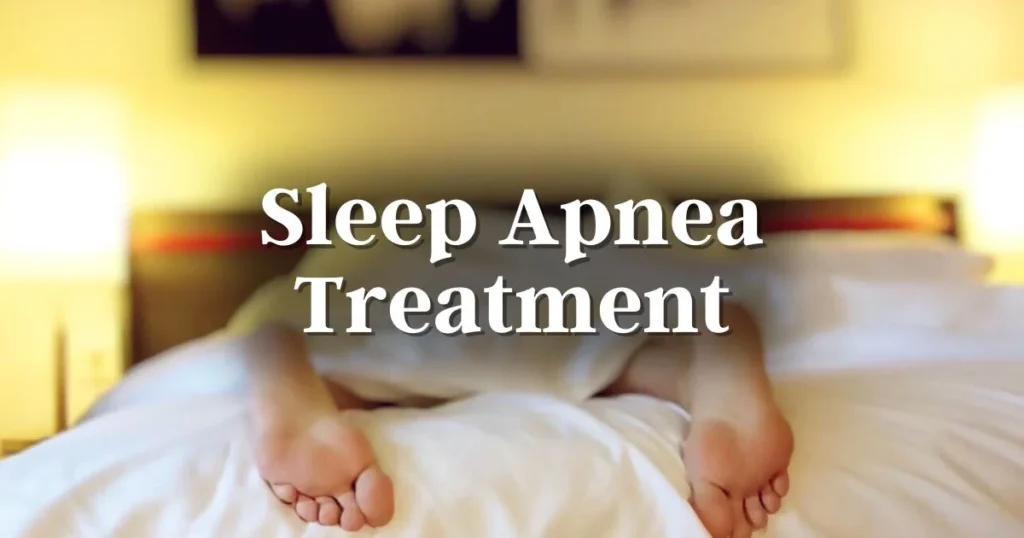Last updated on March 4th, 2024 at 05:27 pm
Ever found yourself gasping in the dead of night, startled awake by your struggle for breath? Perhaps your partner nudges you, complaining about your deafening snores?
The snorting, choking, and ceaseless interruptions in your sleep could be indicating a more serious issue – sleep apnea.
Sleep apnea, characterized by repeated interruptions in breathing during sleep, is far more common than you might think. According to the Cleveland Clinic, experts estimate it affects about 5% to 10% of people worldwide, yet it often goes unattended, viewed merely as a synonym for ‘noisy sleeping’. But in reality, it’s much more than that.
If left untreated, can lead to more severe health risks, such as hypertension, or heart disease. That’s why it’s important to recognize the symptoms, understand the cause, and seek efficient treatment.
Fortunately, there are effective treatment options are readily available. Through a consistent and effective treatment regime, you can know sleep apnea symptoms, improve your sleep quality, and ultimately enhance your entire health.
Understanding Sleep Apnea

Sleep Apnea – A sleeping disorder, where you experience repeated pauses in breathing while you’re asleep. These can last from a few seconds to a minute and might occur up to 30 times or more in an hour. And herein lies the problem – it disturbs your sleep, leading to low-quality sleep, and as a result, impacts your overall health.
When it comes to types of sleep apnea, there are principally three:
- Obstructive Sleep Apnea (OSA): This is the most common type. It occurs when the muscles of the throat relax, causing the airway to narrow or close as you breathe in.
- Central Sleep Apnea (CSA): This type is less common. Here, the issue lies with the brain and not the throat muscles. The brain fails to send correct signals to the muscles that control breathing.
- Complex Sleep Apnea Syndrome (CompSAS): This type, also known as treatment-emergent central sleep apnea, is a blend of the two above. This occurs when someone has both OSA and CSA.
Common Causes and Risk Factors Associated with Sleep Apnea:
- Obesity – One of the primary risk factors for OSA because extra fat deposits around the upper airway can obstruct breathing.’
- Aging – Sleep apnea affects adults older than 60 years of age. Although, this doesn’t mean if you’re young, you’re immune. Sleep apnea can affect anyone, regardless of age.
- Lifestyle Habits – Smoking, for example, can increase inflammation and fluid retention in the upper airway, leading to sleep apnea. Also, the use of alcohol, sedatives, and tranquilizers can relax muscles in the throat and cause sleep apnea.
Symptoms and Diagnosis

Signs you might have sleep apnea:
- Loud Snoring – The kind that comes with gasping, choking, or even prolonged breath-holding intervals
- Daytime Fatigue – It’s a constant, creeping tiredness that just doesn’t let up.
- Morning Headache – Not because of too much work, but because your brain has been short of oxygen all night.
Don’t overlook these symptoms as this could be your body’s SOS signal during one of those silent gaps in breathing. And, let’s not forget the mood swings, lack of focus, or insomnia.
If these symptoms sound familiar, the next logical step is diagnosis by seeing a professional. The gold standard for sleep apnea diagnosis is a sleep study. Either you’ll spend a night at a clinic where they will examine your sleep, or you’ll get a home sleep apnea test, which is less comprehensive but might just do the trick in clear-cut cases.
During these tests, various aspects of your sleep are monitored: your heart rate, breathing patterns, brain waves, and oxygen levels. Maintaining a consistent sleep schedule – Settling into a regular schedule of sleep helps your body anticipate and prepare for sleep, leading to a better quality of sleep.
Continuous Positive Airway Pressure (CPAP) Therapy

The Role of CPAP in Sleep Apnea
What CPAP therapy does is quite straightforward: it keeps your airway open during sleep. This is achieved by delivering a stream of air at a pressure that’s just right to ensure your airway stays unblocked, allowing you to breathe smoothly and sleep soundly.
Tips for Adapting to CPAP Therapy
- Ease Into It: Start by using the CPAP while awake. Spend time with it while you’re doing something relaxing, like watching your favorite series or reading a book. This can help reduce anxiety associated with the device at bedtime.
- Get the Right Fit: Masks come in various shapes and sizes. It’s important to find one that fits well—neither too tight nor too loose. Some popular types include nasal pillows, nasal masks, and full-face masks. Work with a specialist to find your Cinderella fit.
- Make Use of Features: Many modern CPAP machines come with ‘ramp’ features that slowly build up the pressure, making it easier to fall asleep. Also, consider using machines that have a humidifier to lessen the irritation in your nose and throat.
- Create a Support System: Sharing experiences with others who use CPAP therapy can be enlightening and encouraging. Consider joining a support group, either in person or online.
- Maintenance: Keeping your device clean is essential. A well-maintained CPAP machine works efficiently and is more comfortable to use.
- Be Patient: Give it time. Some discomfort in the early days is a small price to pay for the remarkable benefits like improved sleep quality and overall health in the long run.
Incorporating your CPAP into your nightly routine may require some adjustments, but patience and consistency are vital. Consult with your healthcare provider to tailor CPAP therapy to your needs and help ease the transition.
Conclusion
If you like this article, join our community! We’re dedicated to sharing information to help you live a better life. Keep an eye out for more tips on personal growth, marketing, business, and other topics that can positively impact your daily life.

